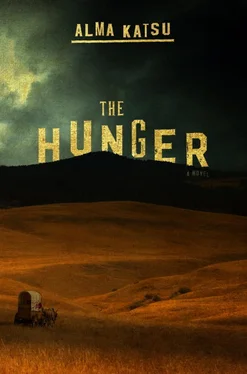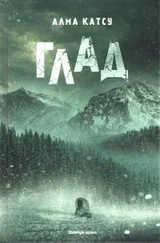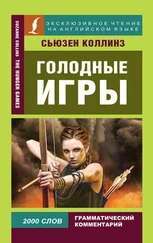He pushed open the door and almost shouted. A cluster of skulls stared back at him from the reeking gloom.
Not skulls— near skulls. People so emaciated they looked like skeletons.
One of them moved and let out a faint groan.
Horror and hope swept through James Reed in a dizzying wave. He’d found them—some of them, anyway. They were alive.
And then a hushed, ragged voice emerged from the darkness. The voice of a girl, young, almost unrecognizable. “Father?”
It was Virginia. His daughter. He could make out her features now, though they’d been ravaged by hunger and transformed—teeth jutting from a drawn face. There was a pause, and he wasn’t sure if he’d be able to stand the emotion that took hold of him by the throat. But then it was as if a bright light lit him from within, and he felt certain—more certain than he’d ever been in his life—that he did understand what love was.
He fell to his knees and reached out a hand.
Readers familiar with the tragic story of the Donner Party will quickly realize that I’ve taken many liberties in shaping the material for fiction. Names, locations, and dates have remained but much else has been changed to fit the story. I even added a few completely fictional characters: Walton Gow, Edwin Bryant’s mentor, did not exist in real life, although Davy Crockett did have his appendix removed while serving in the Tennessee legislature. Thomas, Elitha’s ill-fated love, is based on John Baptiste Trudeau. I’d intended to use Trudeau but when the plot called for changes that would conflict with Trudeau’s history, I decided to create a new character on whom we could make any demands required by the story. This is why Trudeau doesn’t appear in the novel.
I have Tiffany Morris to thank for a thorough, culturally sensitive read of the manuscript and for providing extensive notes on problematic paradigms and tropes to avoid. It is always difficult to balance historical inclusion of the very real—and often very harmful—prevailing attitudes that existed at the time, in particular toward native peoples and their cultures, and at the same time not to in any way perpetuate or advocate for those views. The often problematic attitudes toward Native American groups demonstrated in some of the white settlers in the text do not reflect the feelings and thoughts of myself or the team.
Even a “reimagining” of a historical event, of course, requires a considerable amount of research. Much has been written about the Donner Party tragedy, which turns out to be both a blessing and a curse. A blessing, because you can usually find the answer to your question if you keep digging; a curse because there’s no end to the amount of material to dig through. If you are looking to learn more about the true-life events, I recommend two books that I relied on most heavily: the superb The Donner Party Chronicles: A Day-by-Day Account of a Doomed Wagon Train (1846–1847) by Frank Mullen Jr. (Halcyon, Nevada Humanities Committee) and Desperate Passage: The Donner Party’s Perilous Journey West by Ethan Rarick (Oxford University Press). Additionally, I was able to absorb some of the flavor of the period from Covered Wagon Women: Diaries and Letters from the Western Trails, 1840–1849 , Kenneth L. Holmes, editor (University of Nebraska Press). I’d also like to thank the staff at the Donner Memorial State Park in Truckee, California, and the Fort Bridger State Historic Site in Wyoming for their hospitality during my visits.
This novel is truly a joint effort, the product of close collaboration with Glasstown Entertainment’s Lauren Oliver and Lexa Hillyer. Thanks also to Glasstown editor Jessica Sit, whose input helped to make this novel what it is, as well as to Lynley Bird and Emily Berge for their careful reads.
Heartfelt thanks, too, to Sally Kim at G. P. Putnam’s Sons, the most gracious and capable editor an author could hope for, and to my agent Richard Pine, Eliza Rothstein, and Glasstown’s agent Stephen Barbara for their good counsel and patience. Lastly, thanks to Howard Sanders and Jason Richmond at the United Talent Agency for their work on bringing The Hunger closer to the big screen.

Photograph of the author © Suzette Niess
Alma Katsuis the author of The Hunger , The Taker , The Reckoning , and The Descent . She has been a signature reviewer for Publishers Weekly and a contributor to The Huffington Post . She is a graduate of the Master’s writing program at the Johns Hopkins University and received her bachelor’s degree from Brandeis University. Prior to the publication of her first novel, Katsu had a long career as a senior intelligence analyst for several U.S. agencies and is currently a senior analyst for a think tank. She lives outside of Washington, D.C., with her husband.
almakatsubooks.com
 AlmaKatsuBooks
AlmaKatsuBooks
 almakatsu
almakatsu

What’s next on your reading list?
Discover your next great read!
Get personalized book picks and up-to-date news about this author.
Sign up now.
ALSO BY ALMA KATSU

The Taker
The Reckoning
The Descent

G. P. PUTNAM’S SONS
Publishers Since 1838
An imprint of Penguin Random House LLC
375 Hudson Street
New York, New York 10014

Copyright © 2018 by Alma Katsu and Glasstown Entertainment, LLC
Penguin supports copyright. Copyright fuels creativity, encourages diverse voices, promotes free speech, and creates a vibrant culture. Thank you for buying an authorized edition of this book and for complying with copyright laws by not reproducing, scanning, or distributing any part of it in any form without permission. You are supporting writers and allowing Penguin to continue to publish books for every reader.
Library of Congress Cataloging-in-Publication Data
Name: Katsu, Alma author.
Title: The hunger : a novel / Alma Katsu.
Description: New York : G. P. Putnam’s Sons, [2018] | “Created by Paper Lantern Lit.”
Identifiers: LCCN 2017019689 | ISBN 9780735212510 (hardcover) | ISBN 9780735212527 (ebook)
Subjects: LCSH: Donner Party—Fiction. | GSAFD: Horror fiction. | Historical fiction.
Classification: LCC PS3611.A7886 H86 2018 | DDC 813/.6—dc23
LC record available at https://lccn.loc.gov/2017019689
p. cm.
This is a work of fiction. Names, characters, places, and incidents either are the product of the author’s imagination or are used fictitiously, and any resemblance to actual persons, living or dead, businesses, companies, events, or locales is entirely coincidental.
Читать дальше


 AlmaKatsuBooks
AlmaKatsuBooks almakatsu
almakatsu









![Алма Катсу - Голод [litres]](/books/432580/alma-katsu-golod-litres-thumb.webp)




